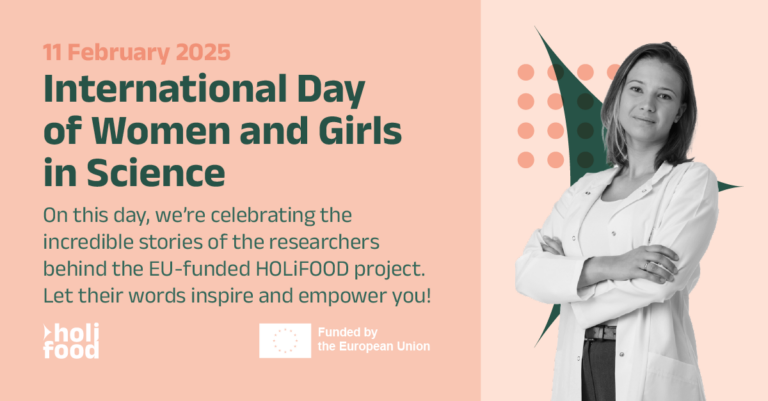The dedicated stories of innovative women in the HOLiFOOD project

Turn up the volume, women in STEM are talking! 🎥
Each year in February, the United Nations honors women in science through the International Day of Women and Girls in Science.
The special day serves as a reminder of the essential role women and girls have in science and technology fields, emphasising the need to enhance their involvement.
In this video, we present the story of dedicated, innovative and perseverant women within the project, to learn about
- Their journey into science
- How the landscape in science has evolved for women
- Their advice to young girls who are passionate about science
Listen to those women and get inspired !
https://www.youtube.com/watch?v=w3Tt-kOO7B8
“Let us choose for ourselves our path in life, and let us try to strew that path with flowers.”
Emilie du Châtelet
Transcript of the video
Can you share your journey into science? |
Ane Arrizabalaga Larranaga – Wageningen Food Safety Research:
“When I decided that I wanted to be a researcher for my family, I was the first one, so this was quite weird but they all support me. I really encourage young researchers or young girls for the future that they follow their dreams, what they like, and that I would like you to really reach what you really want.”
Ine van der Fels-Klerx – Wageningen Food Safety Research:
“I grew up at a farm. We had dairy cows, I loved to be outside and I was always interested in biology. I had some interest in science, so I read this magazines about science also as a child. So I started studying in Wageningen, which is a university in agrifood. I found my job really a bit by coincidence because my parents, they found a vacancy and I was still studying, but they said it is good for you to practice. They told me good to practice writing application letters, and so I did. And then I got my first job in science, actually. I really liked it and yeah, still work in science.”
Naomi Dam – Wageningen Food Safety Research:
“I started doing research because I think that always since I was a little kid that I wanted to make the world a better place. And I think research is something that really contributes to that, especially doing research on food safety. By enhancing food safety, I hope we can make the world a better and also a little bit of a safer place.“
What inspired you to pursue a career in research? |
Cristina Serra – Wageningen University:
“It was actually the researchers that I met through this way. I saw them really passionate about the research that they were doing and how we could contribute to a better future and a better world, how we contribute to overface, to overcome the different challenges from the industry.”
| How do you balance the demands of being a researcher with other aspects of life, and what motivates you to keep pushing the boundaries of your field despite challenges? |
Annalisa De Girolamo – Italian National Research Council:
“I’m a researcher, but first of all I’m a mum of three wonderful boys. Easy? Absolutely not. But if you are resolute in your role, in your choices, you will be able to get the right recognition for your work.”
In your experience, how has the landscape for women in science evolved? |
Margreet van der Burg – Wageningen University:
“I think the landscape for women in science has changed a lot. When I started in the 80s, there was hardly any woman to find. I made beautiful graphs of the women in academia; they were on the top of the 100 percentage and all the most was white. So, when we see the figures now, it changed a lot. But we’re still working on the culture, that everyone feels safe and that women also have the same opportunities to really progress in their career and not forced to take out our professions or step out.”
Ane Arrizabalaga Larranaga:
“When I started doing my bachelor, we were really like from out of 50 people, 10-ish girls. But when I started doing my master, we were more girls. During my PhD, actually, we were like more women than men. And then also during my work right now as a researcher, we are more women in the management and research field than men. So I think this has been changed a lot, and I hope that we’ll continue changing to equality.“
What changes would you like to see to further support future generations of women researchers? |
Margreet van der Burg:
“We now have these general equality plans in place for research organizations and academia. To really make us sustainable with enough money and budget that we not only support women as women, but also the whole institution to make that room and to involve men in supporting that as well. I hope when I’m an old granny that we can say wow, it worked out well.”
What advice would you give to young girls who are passionate about science? |
Really go for your dream.
There are lots of things which you may perceive to be barriers. You may feel shy about speaking in public. You may worry about being an imposter when dealing with other colleagues. But the point is, what’s the worst thing that can happen? No one’s going to remember if you say something really silly in five years’ time. But what you’ve got is a lot to win. So don’t think of everybody about you, how you’re interacting with other people, don’t think about other people’s approval. Think about what you believe in, about what you want to deliver to your audience, how you want to progress your career, and doing those things I think will make sure that you succeed in progress your career.”
Lynn Frewer University of Newcastle Upon Tyne
“Sounds a bit strange, but I would really follow your own route, what you like to do, what you’re passionate about, because we need to work for like until we’re close to 70 in the Netherlands, at least 68 at the moment. Well, if you start at 23, it’s 45 years. So you really need to do something that you love/ So if you’re passionate about science, then I would go for it, yes.”
Ine van der Fels-Klerx Wageningen Food Safety Research
“I would like you to really reach what you really want. And if it is research, even if it is hard work, you will manage. you will manage. So go for it.”
Ane Arrizabalaga Larranaga Wageningen Food Safety Research
“I would say find friends, find the good teacher, find somebody, the deacon of the school, to support you, because it’s good to be backed up. And then go for it. And always be sure that you are in in a group of yeah soul mates that can strengthen you also when it’s sometimes a bit difficult.”
Margreet van der Burg Wageningen University
“I would recommend searching for reference, for women scientists that were not afraid of pursuing what they liked. You are capable of everything that you want to do and everything that you put yourself as a scope.”
Xenia Pascari Bundesinstitut für Risikobewertung



